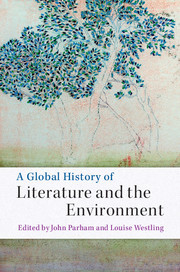A Global History of Literature and the Environment
Langue : Anglais
Coordonnateurs : Parham John, Westling Louise

This book offers a wide-ranging international history of environmental writing from ancient Mesopotamian and Asian works to the present.
In A Global History of Literature and the Environment, an international group of scholars illustrate the immense riches of environmental writing from the earliest literary periods down to the present. It addresses ancient writings about human/animal/plant relations from India, classical Greece, Chinese and Japanese literature, the Maya Popol Vuh, Islamic texts, medieval European works, eighteenth-century and Romantic ecologies, colonial/postcolonial environmental interrelations, responses to industrialization, and the emerging literatures of the world in the present Anthropocene moment. Essays range from Trinidad to New Zealand, Estonia to Brazil. Discussion of these texts indicates a variety of ways environmental criticism can fruitfully engage literary works and cultures from every continent and every historical period. This is a uniquely varied and rich international history of environmental writing from ancient Mesopotamian and Asian works to the present. It provides a compelling account of a topic that is crucial to twenty-first-century global literary studies.
List of figures; List of contributors; Acknowledgments; Chronology; Introduction Louise Westling and John Parham; Part I. Beginnings: 1. The natural world in ancient Mesopotamian literature Stephanie Dalley; 2. Environments of early Chinese and Japanese literatures Karen Thornber; 3. The Garden of Eden in the Hebrew Bible Deborah Green; 4. Ecopoetics and the literature of ancient India Murali Sivaramakrishnan; 5. Ancient Greek literature and the environment: a case study with Pindar's Olympian 7 Chris Eckerman; 6. 'Who shall be a sustainer?': maize and human mediation in the Maya Popol Vuh Allen Christenson; 7. I invoke God, therefore I am: nature's spirituality and its ecological impact in Islamic texts Sarra Tlili; Part II. The Development of Humanism and the Industrial Age: 8. 'Viking' ecologies: Icelandic sagas, local knowledge, and environmental memory Steven Hartman, Reinhard Hennig and Astrid Ogilvie; 9. Human responses to the environment in Medieval literature Gillian Rudd; 10. Remaking eighteenth-century ecologies: arboreal mobility Elizabeth H. Cook; 11. Romantic ecology, Aboriginal culture, and the ideology of improvement in British Atlantic literature Kevin Hutchings; 12. Natural history in the Anthropocene Laura Dassow Walls; 13. Bleak House, Liquid City, Climate to Climax in Dickens Karen Chase and Michael Levenson; 14. Fantastic metabolisms: a materialist approach to modern eco-speculative fiction Tom Sykes; Part III. The Anthropocene: 15. Climate and culture in Australia and New Zealand C. A. Cranston and Charles Dawson; 16. Modern English fiction Kelly Sultzbach; 17. Ecological thought and literature in Europe and Germany Hubert Zapf; 18. From birds and trees to texts: an ecosemiotic look at Estonian nature writing Timo Maran and Kadri Tüür; 19. Contemporary British poetry and the environment Leo Mellor; 20. Rescuing nature from the nation: ecocritical (un)consciousness in modern Chinese culture Hangping Xu; 21. Eating life at a contaminated table: the narrative significance of toxic meals in contemporary Japan Yuki Masami; 22. Commodity frontiers, Caribbean natures, and the aesthetics of ecological revolution in Trinidadian literature Michael Niblett; 23. Petro-violence and the act of bearing witness in contemporary Nigerian literature Byron Caminero-Santangelo; 24. Black ants and bones: Nehruvian science and third-world environment in the fiction of Satyajit Ray Upamanyu Pablo Mukherjee; 25. Brazilian women poets on gender, nature, and the body Izabel F. O. Brandão; 26. Can the environmental imagination save the world? Lawrence Buell; Further readings; Index.
John Parham is Associate Head of Research and Principal Lecturer in Media and Cultural Studies in the Institute of Humanities and Creative Arts at the University of Worcester. He has written Green Media and Popular Culture: An Introduction (2016) and Green Man Hopkins: Poetry and the Victorian Ecological Imagination (2010), edited The Environmental Tradition in English Literature (2002) and has co-edited Literature and Sustainability: Exploratory Essays (forthcoming). He has published extensively on Victorian ecology (including studies of Dickens, Mill, Gaskell and Zola) and green popular culture.
Louise Westling taught in the English Department at the University of Oregon from 1977 to 2015 and in the Environmental Studies Program from 1996 to 2015. Her publications include Sacred Groves and Ravaged Gardens: The Fiction of Eudora Welty, Carson McCullers, and Flannery O'Connor (1985); The Green Breast of the New World: Landscape, Gender, and American Fiction (1996); The Logos of the Living World: Merleau-Ponty, Animals, and Language (2013); and, as editor, The Cambridge Companion to Literature and the Environment (Cambridge, 2013).
Louise Westling taught in the English Department at the University of Oregon from 1977 to 2015 and in the Environmental Studies Program from 1996 to 2015. Her publications include Sacred Groves and Ravaged Gardens: The Fiction of Eudora Welty, Carson McCullers, and Flannery O'Connor (1985); The Green Breast of the New World: Landscape, Gender, and American Fiction (1996); The Logos of the Living World: Merleau-Ponty, Animals, and Language (2013); and, as editor, The Cambridge Companion to Literature and the Environment (Cambridge, 2013).
Date de parution : 12-2016
Ouvrage de 459 p.
16x23.5 cm
Thème d’A Global History of Literature and the Environment :
© 2024 LAVOISIER S.A.S.



